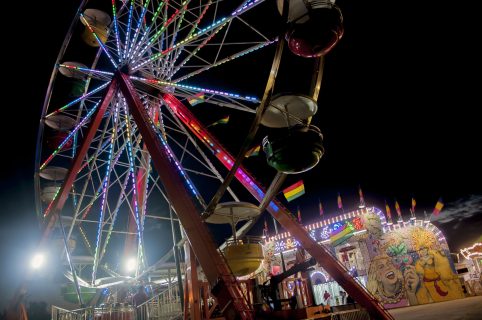John Cowan
Published 12:00 am Wednesday, March 5, 2008

- John Cowan
He has been a central figure in a group that pioneered a whole new form of bluegrass music (New Grass Revival), one of only a double handful of people in any genre who can have that said about them. He has flirted with the country mainstream in two different groups (New Grass Revival and the Sky Kings). He has been a popular choice as a session vocalist in Nashville (Foster & Lloyd, Garth Brooks, and others). He has had a stint touring with the Doobie Brothers. Now it’s time to add another milestone to the impressive career of John Cowan: solo artist.
Area fans, first coming into contact with Cowan in Duckbutter, know all about the combination of soaring vocals, groove-happy bass, and seemingly endless musical influences from which he draws. With the summer release of John Cowan on Sugar Hill Records, Cowan has gone beyond everything he has done before on record and woven the breadth of his talents into a comprehensive statement of who he is. Cowan marked the occasion in July with two appearances in Bowling Green — July 21at State Street Pub and July 22 at Disc Jockey.
Trending
Although it is technically Cowan’s second solo record, John Cowan is his first release of original music (the other, Soul’d Out, was an EP of r&b classics recently expanded to full length and re-released). Although you have to get into the tracks on the album to really get a feel for the astonishing range of musics, the first few seconds of the first song give the listener a clue. “Roll Away the Stone” starts with two bars of a sampled urban rhythm, then a banjo slides in for two bars, and finally the whole band joins in with acoustic instruments sharing equal space with more r&b appointments. With Cowan’s sense of commonality among different influences, everything fits together — everything works.
Cowan told the Amplifier about how he became exposed to all the styles and influences that made him so innovative and that has him playing venues on tour that cut across genre lines. He came from a family that liked to sing and perform; he sang in choir from 5-6 years old. In 1964-65 when he lived in Pittsburgh, the Beatles hit America and, like many others, influenced Cowan. He started playing in 1967-68, about the time when black artists were crossing over; John bought “Knock on Wood” by Sam & Dave to learn the bass parts, and he got wrapped up in the music of black music icons. Then FM radio started happening with its lack of restrictions. All this was “a renaissance period” to Cowan. He said he was “a garage band warrior” by the time he joined New Grass Revival in 1974.
That was the lineup that vaulted New Grass Revival onto the music scene: bassist Cowan, mandolinist/fiddler Sam Bush, dobro and flattop guitar player Curtis Burch, and banjoist Courtney Johnson. Landing in a group with the like-minded Bush, who was at home with both Bill Monroe and Jimi Hendrix, gave Cowan freedom to stretch and include his various influences in the mix. His soulful tenor, endless high notes, and syncopated bass lines were integral to the innovative New Grass Revival sound. Purists balked in the beginning, but New Grass Revival won a broad following and paved the way for a music that came to be known as “newgrass” after the band, much like the moniker for bluegrass came from Bill Monroe and the Blue Grass Boys.
Through the classic Flying Fish catalog, a couple of releases on Sugar Hill (when Bela Fleck and Pat Flynn took the places of Johnson and Burch), and the major label period on Capitol, New Grass Revival carved out a new piece of musical territory. Of his 15 years with New Grass Revival, Cowan said he is “very very proud of it. . . . If I died tomorrow, I’d be happy with what we did.” Comparing their achievements to those of fellow pioneers Bill Monroe and Bob Wills, Cowan said the accomplishments of New Grass Revival “far exceeded the desire to be rich and famous.”
After the demise of New Grass Revival in 1989, Cowan had his hand in various activities. He did backing vocals for many artists’ releases, including Foster & Lloyd, Wynonna, Travis Tritt, and Garth Brooks. It was as an opener for New Grass Revival at a 1983 show in Horsethief Canyon near Cushing, Oklahoma (which this reporter attended and still has stage pictures of Cowan wearing a Gumby t-shirt to prove it) that the then-unknown Brooks came into contact with Cowan. Years later, Brooks covered NGR’s “Calling Baton Rouge” with Cowan, Bush, Fleck, and Flynn performing on the track.
Cowan took another run at the country mainstream when he joined with Poco’s Rusty Young and Foster & Lloyd’s Bill Lloyd in 1990 to form the Sky Kings. As one would expect with this threesome, the vocal harmonies were prominent in the Sky Kings’ music. “Picture Perfect” was a modest hit for the Sky Kings, much like “Calling Baton Rouge” was for New Grass Revival, and mainstream country success proved to be elusive. The Sky Kings folded in 1997.
Trending
Also in 1997, Cowan connected in Los Angeles with Wendy Waldman, who had contributed songs to New Grass Revival before (“Can’t Stop Now” being the best known). In addition to being an accomplished songwriter (130 recorded songs, including the Grammy-winning “Save The Best For Last,” “Letters Home,” and “Fishin’ In The Dark” ), recording artist, and member of Bryndle with Karla Bonoff and Kenny Edwards, Waldman has produced records for New Grass Revival (Friday Night In America) and Karla Bonoff. Cowan and Waldman started writing together, and Cowan eventually asked Waldman to produce a solo album for him, a task Waldman said she happily accepted. Recording for what would become John Cowan started in 1997 and finished in 1999. Cowan put it out himself and sold 5,000 copies at shows. Sugar Hill Records picked it up and released it this summer.
By this time, Cowan found himself more at home with the multiple styles he brought to any musical endeavor. “I finally figured out what I am, which is a little bit of everything . . . a fusion person,” Cowan said, then he launched into a discussion of Little Feat, the Allman Brothers, Duke Ellington, the Grateful Dead, and other artists who fused different musics. With John Cowan, all the different facets of his musical persona are reflected.
Part of the reason for this may be that, as opposed to his New Grass Revival days, Cowan co-wrote most of the album’s 13 tracks. The songwriting is “one of the things I’m most proud of — it’s my music now.” Meeting Bill Lloyd in the early �80s piqued Cowan’s interest in writing. “I think you can learn the craft of songwriting. I was a natural born singer; now I’m learning the other side of it.” Cowan added, “I’ve had the opportunity to work with great songwriters.”
The other part was two years of working with Waldman to wade through all his influences and identify what John Cowan music is. Without a record label deadline and by using a project studio, Cowan had the time to work out ideas and find the best ways to express the breadth of his muse.
The mix of assorted styles on John Cowan is so varied — bluegrass, r&b/soul, rock, celtic, country, and world music. Yet instead of being schizophrenic, something unifies it all into a personalized focus. The themes of his songs soar like his amazing tenor, particularly “High Above the Powerlines” with its metaphors about reaching beyond our electronic, material lifestyle to connect to one’s spirit. The tender “All I Wanna Feel” encapsules the spectrum of Cowan’s singing, as the melody works its way higher into his range in patterns familiar to his fans, culminating in a passionate long high note. One of the showcase moments is the “cowpunk” (Cowan’s words) energy of the rollicking starchaser-in-LA tale “Wichita Way;” stinging guitar plays off of genial but angular mandolin. “I Want You To” is as heart melting and soulful as any Luther Vandross offering. Then you have the swampy blues of “Mississippi Delta Time” that makes life in the delta feel festive, and “Nothing But The Blues” where Cowan offers a commiserating lament “Mr. Bill Monroe and ol’ Muddy Waters knew/What it’s like to love and lose.”
Certain aspects come across more strongly in live performance. At the Ellis Place show, Cowan and his John Cowan Band — Scott Vestal (banjo, guitar, vocals), Jeff Autry (guitar, vocals), Randy Kohrs (dobro, electric dobro, vocals) and Posi Leppikangas (drums) — were a mixture of string traditions and syncopated bass grooves. The band’s instrumentals and breaks were traditional nicely bent, in the way New Grass Revival used to do it. Vestal was amazing in his own instrumental vocabulary, and Kohrs supercharged any song that he played his wicked electric dobro on. Cowan drove the sound rhythmically with his bass, totally absorbed into his bass grooves, head bobbing, lips pursed.
Cowan delighted the crowd with the new songs as well as his NGR standards like “A Good Woman’s Love” and “Four Days Of Rain.” Cowan did an arresting rendition of “Dark As a Dungeon” which also appears on the new album. The last song of the encore saw the JCB weave and charge their way through the 9 1/2 minute instrumental “Sligo,” but short of the ending they inserted Yes’ “Long Distance Runaround” before returning to the ending of “Sligo” and concluding the show. The patrons of Ellis Place saw musical soul spoken in more dialects than the average concertgoer sees in a year, yet all with a sense of unity.
Cowan takes another swing on his tour into Kentucky this month, appearing August 11 at Bluegrass in the Park in Henderson and August 12 at Lynagh’s in Lexington. He’ll then perform August 13 on the season’s first Sams Place concert series at the Ryman Auditorium in Nashville hosted by Gary Chapman, and then he’ll be back in Nashville August 26 at Exit/In.
Wendy Waldman may have the best take on John Cowan. She says, “He is at once a bluegrass legend and a fierce rock tenor, a blue-eyed soul singer and a gospel musician.” Waldman thinks the Internet and other alternative marketing options give Cowan’s music a better chance of being widely heard than if he were offered up by a major label as next month’s flavor — “Thankfully he’s making records in an era when he has the option to grow steadily and spread the word for a long long time — like a great novel, as opposed to a new action figure.”
The album John Cowan is available in stores and online, including John Cowan or www.sugarhillrecords.com
Don Thomason is a writer and musician living in Dunbar. Visit him at www.myspace.com/donthomasonmusic






